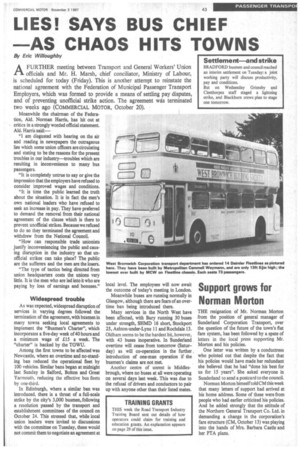LIES! SAYS BUS CHIEF AS CHAOS HITS TOWNS
Page 45

If you've noticed an error in this article please click here to report it so we can fix it.
By Eric Willoughby
A FURTHER meeting between Transport and General Workers' Union officials and Mr. H. Marsh, chief conciliator, Ministry of Labour, is scheduled for today (Friday). This is another attempt to reinstate the national agreement with the Federation of Municipal Passenger Transport Employers, which was formed to provide a means of settling pay disputes, and of preventing unofficial strike action. The agreement was terminated two weeks ago (COMMERCIAL MOTOR, October 20).
Meanwhile the chairman of the Federation, Aid. Norman Harris, has hit out at critics in a strongly worded official statement. Aid. Harris said:— "I am disgusted with hearing on the air and reading in newspapers the outrageous lies which some union officers are circulating and stating to be the reasons for the present troubles in our industry—troubles which are resulting in inconvenience to many bus passengers.
"It is completely untrue to say or give the impression that the employers have refused to consider improved wages and conditions.
"It is time the public learned the truth about the situation. It is in fact the men's own national leaders who have refused to seek an increase in pay. They have preferred to demand the removal from their national agreement of the clause which is there to prevent unofficial strikes. Because we refused to do so they terminated the agreement and withdrew from the National Council.
"How can responsible trade unionists justify inconveniencing the public and causing disruption in the industry so that unofficial strikes can take place? The public are the sufferers and the men are the losers.
"The type of tactics being directed from union headquarters costs the unions very little. It is the men who are led into it who are paying by loss of earnings and bonuses."
Widespread trouble
As was expected, widespread disruption of services in varying degrees followed the termination of the agreement, with busmen in many towns seeking local agreements to implement the "Busmen's Charter", which incorporates a five-day week of 40 hours and a minimum wage of £15 a week. The "charter" is backed by the TGWU.
Among the first towns to be affected was Newcastle, where an overtime and no-standing ban reduced the operational fleet by 100 vehicles. Similar bans began at midnight last Sunday in Salford, Bolton and Great Yarmouth, reducing the effective bus fleets by one-third.
In Edinburgh, where a similar ban was introduced, there is a threat of a full-scale strike by the city's 3,000 busmen, following a resolution passed by the transport and establishment committees of the council on October 24. This stressed that, while local union leaders were invited to discussions with the committee on Tuesday, these would not commit them to negotiate an agreement at local level. The employees will now await the outcome of today's meeting in London.
Meanwhile buses are running normally in Glasgow, although there are fears of an overtime ban being introduced there.
Many services in the North West have been affected, with Bury running 30 buses under strength, SHMD 16 short, Stockport 25, Ashton-under-Lyne 11 and Rochdale 13. Oldham seems to be the hardest hit, however, with 43 buses inoperative. In Sunderland overtime will cease from tomorrow (Saturday) as will co-operation in the further introduction of one-man operation if the busmen's claims are not met.
Another centre of unrest is Middlesbrough, where no buses at all were operating on several days last week. This was due to the refusal of drivers and conductors to pair up with anyone other than their listed mates.








































































































































